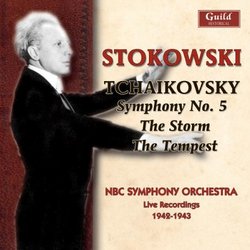| All Artists: Spoken Word, Pyotr Il'yich Tchaikovsky, Leopold Stokowski, NBC Symphony Orchestra Title: Tchaikovsky: Symphony No. 5; The Storm; The Tempest Members Wishing: 0 Total Copies: 0 Label: Guild Original Release Date: 1/1/2009 Re-Release Date: 4/14/2009 Genres: Special Interest, Classical Styles: Forms & Genres, Theatrical, Incidental & Program Music, Symphonies Number of Discs: 1 SwapaCD Credits: 1 UPC: 795754233421 |
Search - Spoken Word, Pyotr Il'yich Tchaikovsky, Leopold Stokowski :: Tchaikovsky: Symphony No. 5; The Storm; The Tempest
 | Spoken Word, Pyotr Il'yich Tchaikovsky, Leopold Stokowski Tchaikovsky: Symphony No. 5; The Storm; The Tempest Genres: Special Interest, Classical |
Larger Image |
CD DetailsSimilar CDs |
CD ReviewsThe old magician Ralph Moore | Bishop's Stortford, UK | 05/15/2009 (4 out of 5 stars) "Leopold Stokowski (1882-1977) enjoyed a recording career spanning an incredible sixty years, from 1917 until shortly before his death. Tchaikovsky was clearly his favourite composer - with a nod towards Bach. He both performed and recorded the Fifth Symphony more than any other of Tchaikovsky's works. I cannot resist, here, wheeling out that celebrated Stokowski quotation: "After I die, should I get to Heaven, I must thank Mr. Tchaikovsky for having given us so many wonderful melodies". There is no doubting the conductor's passion for this composer's music. It is fascinating - if not especially relevant - to think that Stokowski was already eleven years old when Tchaikovsky died.
There are available in the catalogue at any one time about half a dozen Stokowski recordings of the Fifth Symphony. These span the period from 1934, when he made a famous version with the Philadelphia Orchestra, to the 1973 recording made with the International Festival Orchestra when he was an incredible 91 years old. I cannot claim to have heard them all, but Stokowski was remarkably consistent in his interpretations. If you are already a fan, you will agree that his recordings rarely disappoint. Every record collector either owns, knows about, or should know about, his spectacular 1958 recording of "Francesca da Rimini" with the Stadium Symphony Orchestra of New York - "the New York Philharmonic Orchestra in summer drag", as I have heard it facetiously described. The present disc cannot measure up to that one sonically but it is a typically visceral and occasionally even wilful interpretation which will delight Stokowski's legion admirers. On this disc, Stokowski conducts the NBC Symphony, the orchestra especially created for Toscanini. This occurred during the interim in which the other great maestro was sulking over a contractual dispute and refusing to return. The present live, broadcast Tchaikovsky programme, drawn from the 1942-1943 seasons, holds a special interest because it includes two items which Stokowski never commercially recorded. These are "The Storm", a concert overture, and "The Tempest", a "symphonic fantasia", both relatively early works (1868 and 1873, respectively). Of minor historical interest, are the interspersed announcements in the first concert, including some slightly tendentious musings by Samuel Chotzinoff (ironically, Toscanini's biographer). For obvious historical reasons - remember; this was 1942 - Chotzinoff seems to be emphasising solidarity with the Russians by extolling both Russia's contribution to Western civilisation and the "humanist and optimistic point of view" which supposedly inspired Shostakovich. At the same time he draws artistic comparisons between Tchaikovsky and Shostakovich which are not entirely to the latter's advantage. "The Storm", Tchaikovsky's first attempt at large-scale orchestral composition, is his response to a favourite play by Ostrovsky. It is little more than a promising student's work. The hallmarks of Tchaikovsky's mature style are already in evidence but it is a rather shapeless, rag-bag of a piece. Its disconcertingly abrupt mood-changes are more the fault of the music itself, I think, than Stokowski's passionate advocacy. That said, he could have taken a subtler line, as his energetic approach tends to exaggerate its disjointedness. The concluding few bars strike an incongruous "Big Country" note, as if to cap the uncertainty of tone which dogs the piece. Still, the soaring main theme which enters after a minute or so is typically tender and Tchaikovsky is already creating innovative orchestral colours by his use of harps, flutes and timpani. It is by no means ten minutes of music without interest, but hardly vintage Tchaikovsky. And so to the Fifth. There is plenty of brooding soul in the first movement yet the tension never flags; it is truly "allegro con anima". Despite the indulgent swoops and swirls in the brass and strings, there is always a tautness and tension to Stokowski's reading. This precludes any sentimentality and leaves you in no doubt that this is a conductor who knows exactly what he wants and is getting it. Whether you want it, is your choice; I certainly do; if you cannot play Tchaikovsky "romantically" why bother at all? The frenzied rush to the finishing line serves both to contrast with the ensuing andante cantabile but also to illustrate the virtuoso quality of the NBC Orchestra. The second movement is a miracle of over-arching control, embracing all the tenderness and despair of a doomed passion. There is a persistently febrile quality to the playing, which serves merely to underscore the great, soaring melody and remind us that fate will soon once again knock on the door to confirm that all earthly joys are ephemeral. After such profundity, I always find the transition to the famous Waltz something of a grinding change of gear no matter who is conducting. Taneyev observed that a symphony assembled from sketches for operas and ballets poses continuity problems; Stokowski mostly solves the problem by starting delicately and quietly, carefully ratcheting up the tension in slow increments until he can re-establish the fervour which precedes the recurrence of the Fate motif. The final movement is truly "maestoso", restrained and under-stated to counteract any hint of complacency that the switch to E major might suggest, until that sudden headlong charge three minutes in at the allegro vivace. Tchaikovsky fretted that the finale betrayed "something repellent, something superfluous and insincere" - although he later revised this judgement. To me, the triumph is so hard won in the context of the whole symphony that I have no such qualms that it might come off as hollow or pompous; nor, it seems, does Stokowski, who steers his orchestra into the coda and hence triumphantly into port. As was his wont, he forestalls premature applause by cheekily prolonging the timpani roll through the six B major chords which form the false cadence. Wonderful though this concert is, it would be idle to pretend that the sound can do it proper justice or compete with a modern recording; this despite the excellent re-mastering by Guild. For that, you need preferably to turn to a later, stereo Stokowski performance or, to select from a crowded field, choosing either the classic, mid-price Cleveland CBS recording with Szell or perhaps Sian Edwards' version with the LPO on EMI Eminence - a wholly convincing and unpretentious account. The Wagnerian sophistication of the opening of "The Tempest" bears witness to the development in Tchaikovsky's musical idiom in the nine years since the composition of "The Storm". It also shows the musical influences he had experienced in the interim; we are now in the sound-world of "The Ring" and all the better for it. The opening combines a heroic horn theme with a gradual crescendo betraying the influence of "Das Rheingold", but then matters turn more Russian. Stokowski apparently observes a traditional cut but I have nothing to compare this version with and can say only that it seems to work well on its own terms. Stokowski's judgement was, like that of another showman, Beecham, often very sound in such matters. It is another of those Tchaikovsky works inspired by Shakespeare and is much more cohesive than "The Storm". We have storms at sea, depictions of Caliban and, for Miranda and Ferdinand, a strangely swooning, Hollywood-movie-style love theme on the strings, which Stokowski is happy to revel in. " |


